The song is also known as The Unfortunate Miss Bailey. The Burl Ives Songbook states it a traditional tune dating back to the sixteenth century, but with no citation. However, according to The Traditional Ballad Index, the song and melody HAS been credited to George Colman the elder (1732-1794) and George Colman the younger (1762-1836), and prior to 1810. The tune later appears in Colman the younger’s play “Love Laughs at Locksmiths.” (publ. 1840). After the War of 1812 the tune was used for The Hunters of Kentucky.
G
A Captain bold in Halifax,
. D
Who dwelt in country quarters,
. G
Seduced a maid who hanged herself
. D G
One morning in her garters,
. G G7
His wicked conscience smited him,
. C D
He lost his stomach daily,
. D7
He took to drinking ratafia
. C G
And thought upon Miss Bailey.
G C G
Oh, Miss Bailey, unfortunate Miss Bailey,
C G D G
Oh, Miss Bailey, unfortunate Miss Bailey,
One night, betimes he went to bed,
For he had caught a fever,
Said he, “I am a handsome man
And I’m a gay deceiver.”
His candle just at twelve o’clock
Began to burn quite palely,
A ghost stepped up to his bedside
And said, “Behold! Miss Bailey.”
Oh, Miss Bailey, unfortunate Miss Bailey,
Oh, Miss Bailey, unfortunate Miss Bailey,
“Avaunt, Miss Bailey,” then he cried,
“You cannot fright me really.”
“Dear Captain Smith,” the ghost replied,
“You’ve used me ungenteelly.
The Coroner’s quest was hard with me
Because I’ve acted frailly,
And parson Biggs won’t bury me
Though I’m a dead Miss Bailey.”
Oh, Miss Bailey, unfortunate Miss Bailey,
Oh, Miss Bailey, unfortunate Miss Bailey,
“Dear Ma’am,” said he, “since you and I
Accounts must once for all close,
I have a one pound note in the vest of my
Regimental small clothes.
‘Twill bribe the Sexton for your grave.”
The ghost then vanished gaily,
Crying, “Bless you wicked Captain Smith,
Remember poor Miss Bailey.”
Oh, Miss Bailey, unfortunate Miss Bailey,
Oh, Miss Bailey, unfortunate Miss Bailey,
